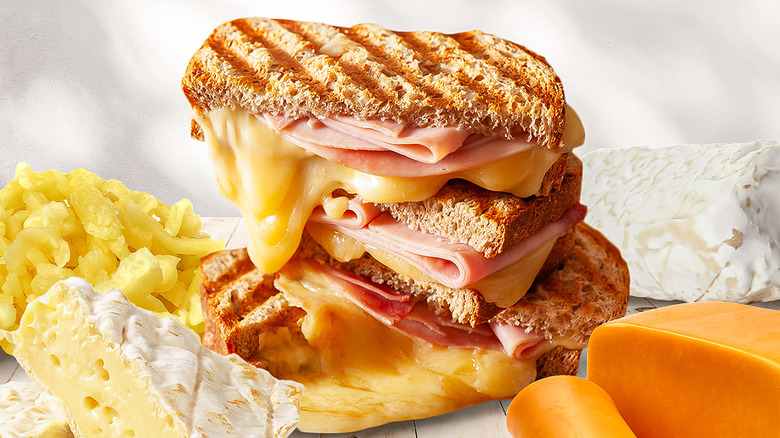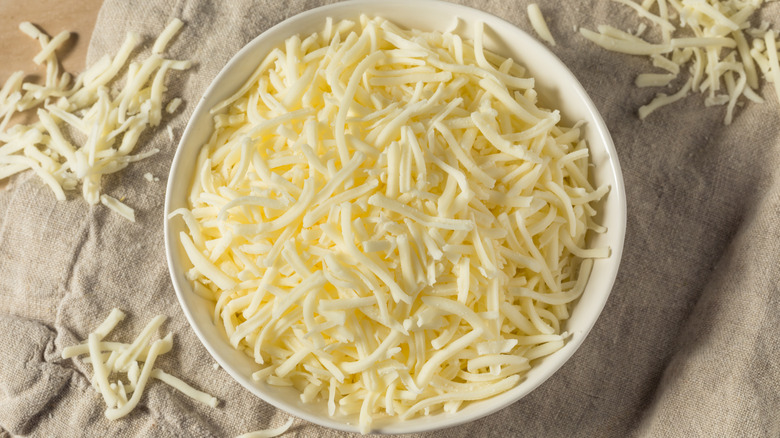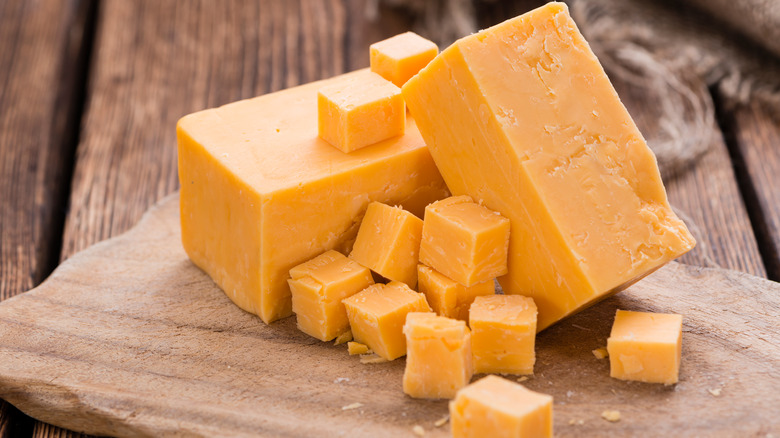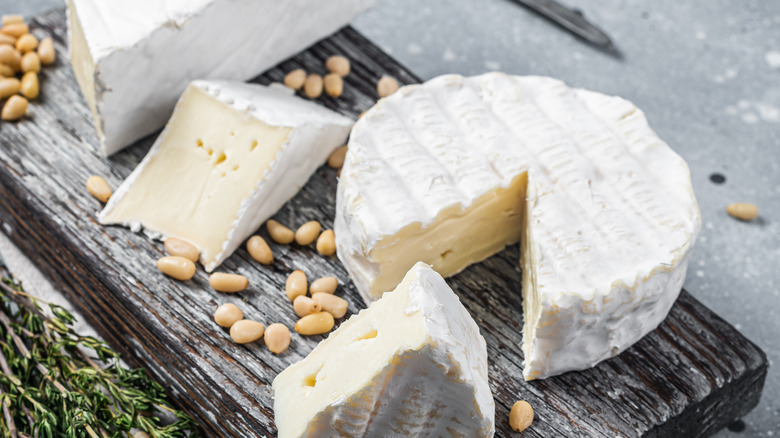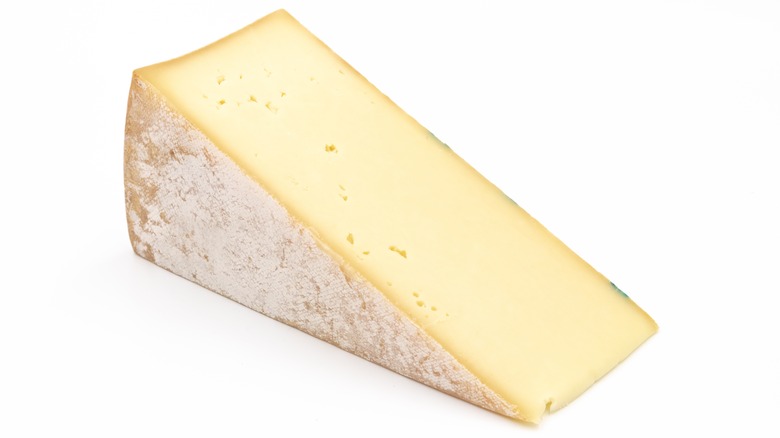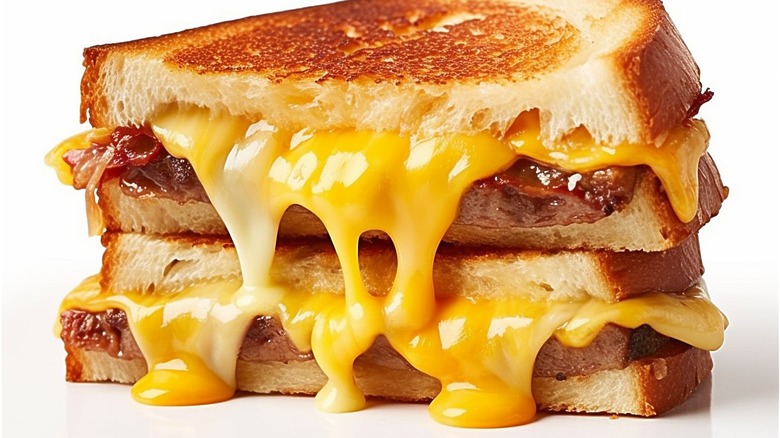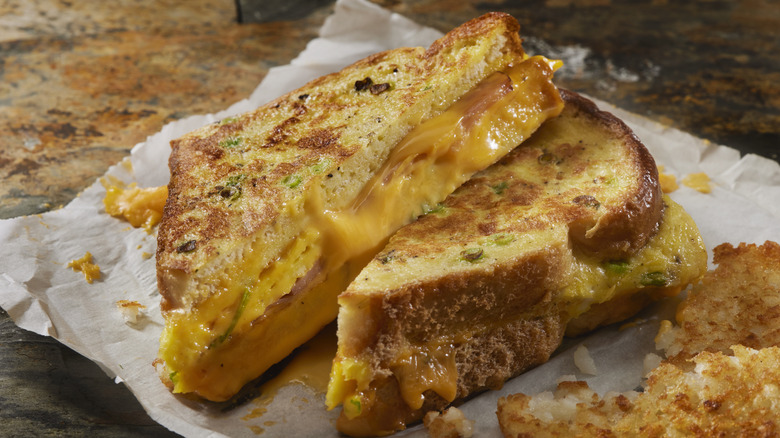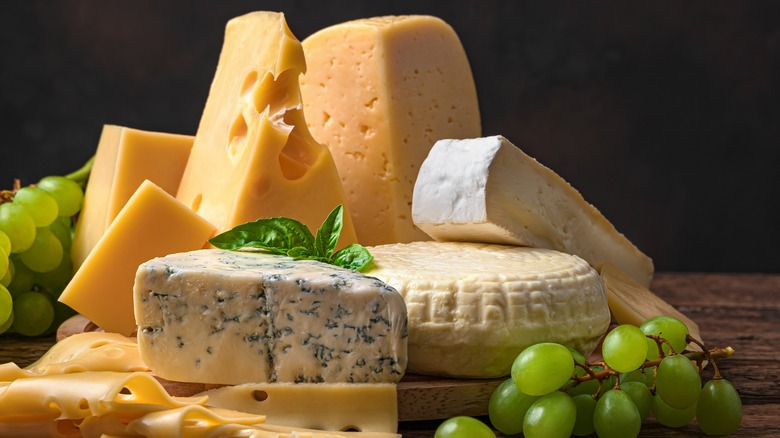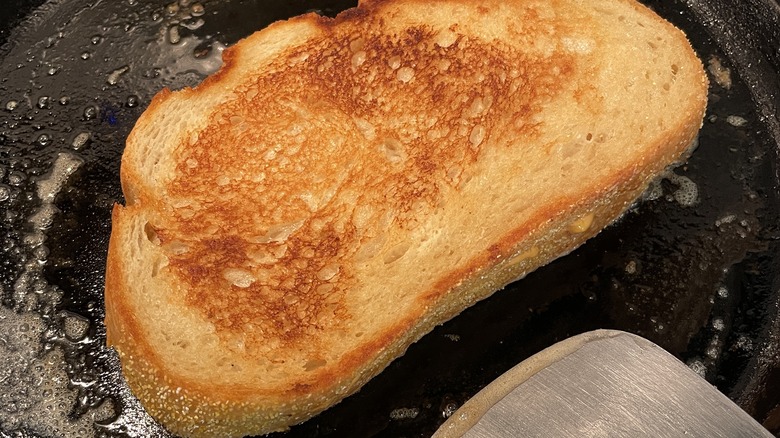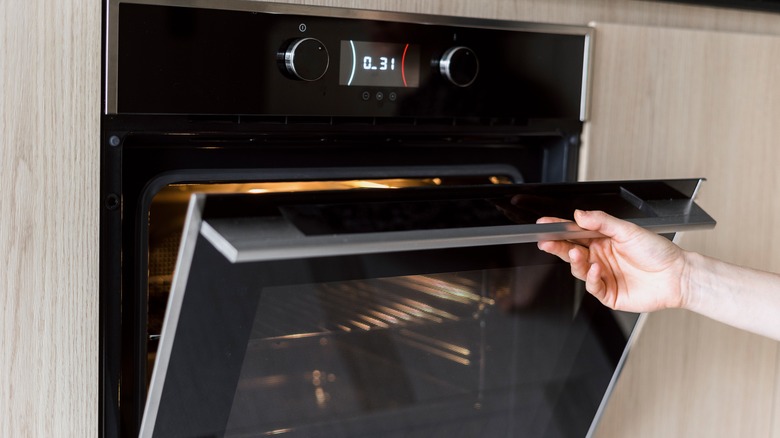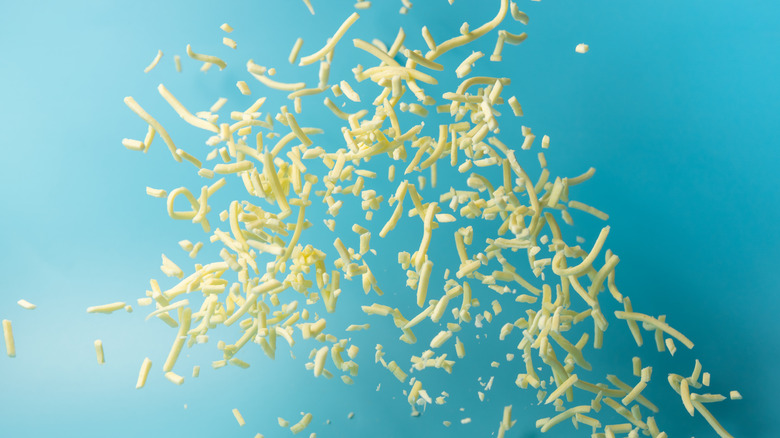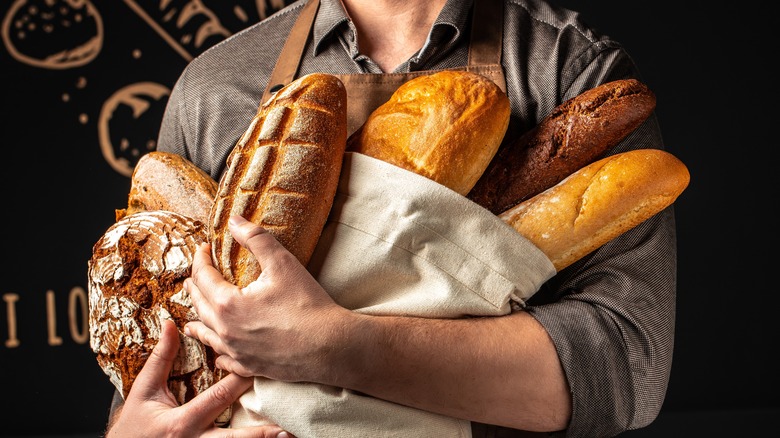7 Types Of Cheese And How To Best Use Them For The Ultimate Grilled Cheese Sandwich
Making grilled cheese may seem like one of the most straightforward things out there. It can be confusing, though, if you don't know where to start. What cheese should you use? What bread is best? And just how do all those food bloggers get that perfect, Instagram-worthy cheese pull? If you have mastered the basic grilled cheese and want to get a little bit more fancy with it, you may be looking for some new ideas.
Luckily, we have reached out to two expert grilled cheese makers, and they've shared with us their tips for choosing the best cheese for grilled cheese sandwiches. First, we spoke to Jessie Johnson, who is the founder of Life As A Strawberry, a food and recipe website. She is a master comfort food maker and prides herself on making delicious, easy-to-follow recipes. Second, we spoke to Lana Stuart, who is the founder of Lana's Cooking. This food blog is focused on recipes from Stuart's own childhood in Georgia. Marrying the nostalgic with the new, Stuart is another master of comfort food who makes a mean grilled cheese.
Mozzarella
The first cheese recommended to us by our experts is mozzarella. This gooey, melty Italian classic is one of Jessie Johnson's go-tos when it comes to grilled cheese. She almost always uses it. Johnson said, it adds "some bulk to a grilled cheese sandwich without overpowering other flavors." At the same time, mozzarella melts exceptionally well; Johnson said that the cheese "give[s] you a great, stretchy cheese pull!"
Of course, there are several types of mozzarella to choose from when you're making grilled cheese. There is fresh mozzarella, which is not necessarily great for grilled cheese sandwiches. This is because it is very wet and might make your bread soggy. There is also aged mozzarella –- this is the stuff that comes in blocks or shredded. Johnson's personal favorite for grilled cheese is shredded mozzarella.
Because mozzarella is such a versatile cheese, it is a great one to pair with other types of cheeses. It also pairs well with other ingredients. For example, this pesto grilled cheese pairs mozzarella with pesto sauce and sun-dried tomatoes for a delicious, five-ingredient grilled cheese.
Cheddar
The same praises that Jessie Johnson sings for mozzarella apply to cheddar cheese, too. The blogger and chef told us, "I almost always include shredded mozzarella or cheddar cheese in a grilled cheese sandwich." Lana Stuart is also a big fan of cheddar cheese, letting us know that it is her personal favorite for grilled cheeses. She likes to use extra-sharp cheddar, telling us, "It's the perfect choice for the classic combination of grilled cheese and tomato soup."
Like mozzarella, cheddar is versatile without being too overpowering. It also goes with many other ingredients; for example, you can try making this delicious bacon-lover's grilled cheese with cheddar for a flavor-packed experience. Another example is this Korean-inspired kimchi grilled cheese.
There are also many different varieties of cheddar to choose from. The region where cheddar comes from impacts its flavor, as does how sharp it is. Mild cheddar is smooth and is aged for two to three months. Sharp cheddar is aged seven to nine months, but some varieties of super sharp cheddar can be aged all the way up to a year. The sharper a cheddar is, the tangier it is.
Brie, gruyère, or goat cheese add a creamy touch
When it comes to adding a bit more flavor, Jessie Johnson often turns to a soft, creamy cheese. Brie, which is well known for its creamy texture and mild flavor, originates in France. It is usually made with cow's milk, although it has also been known to be made with goat's milk. Johnson likes to use brie because it "melts into a rich, buttery filling that's great with a bit of tart leftover cranberry sauce, or summer berries."
One thing that Johnson always considers is how the cheese that she chooses will go with her extra ingredients, if she is adding any. Explaining her process to us, she said, "I try to choose cheeses that complement those add-ins."
Another cheese that Johnson really likes to use is gruyère. Explaining why, she told us, "Gruyère adds a bit of complexity and earthiness that pairs beautifully with roasted mushrooms." Gruyère also pairs really well with figs, such as in this delicious fig grilled cheese recipe.The final creamy cheese that Johnson suggested is goat cheese, which provides a sharp flavor on top of its incredibly smooth texture. "Goat cheese gives you a beautiful burst of bright, tangy flavor that's perfect with a hearty sourdough and fresh herbs," Johnson told us. Goat cheese also pairs well with fruit, jam, and many other sweet takes on grilled cheese.
For semi-firm cheese options, try fontina or Monterey jack
Lana Stuart told us that in addition to cheddar, two of her favorite cheeses for grilled cheese sandwiches are fontina and Monterey jack. These two semi-hard cheeses are a great option if you want a cheese that will melt well, isn't too soft, and doesn't have an overpowering flavor.
Fontina is an Italian cheese that comes from the foothills of the Alps, although there are also Danish and Swedish versions. It has a smooth texture and has little holes in it. If you can't find fontina nearby, then check out these 10 substitutes for fontina cheese.
Monterey jack is a very creamy yellow cheese, and originated n the 1700s in a town that is now San Diego. It is very mild, slightly tangy, and buttery. Its texture is very dense, and it's high in both fat and moisture, which makes it an excellent melting cheese. There are also other versions of jack cheese that are all derived from Monterey jack, including pepper jack (which has spicy peppers in it), and colby jack.
A good cheese for grilled cheese melts smoothly
Jessie Johnson told us that "if you want that ultra-satisfying, Instagram-perfect cheese pull, look for cheeses that melt smoothly and stretch easily when warm." Lana Stuart put it simply: "The best cheeses for grilled cheese are those that melt easily at a moderate temperature and have a good 'pull.'" Some of the cheeses included on this list are mozzarella, cheddar, fontina, provolone, and havarti.
There are many reasons that cheese melts smoothly, which means that there are ways to tell if the cheese you have on hand will melt the way you want it to. Cheeses with higher moisture content melt better because their milk proteins separate more easily. Fat content also matters, and cheese with more fat will melt more easily. Younger cheeses also melt well; generally, the older the cheese, the more difficult it is to melt. While she likes to use cheese that melts well, Johnson also doesn't believe in limiting yourself on cheese in your sandwich. She is a fan of using two to three different varieties of cheese in a grilled cheese.
Pair mild and bold flavors together for a great-tasting sandwich
Both Jessie Johnson and Lana Stuart recommended mixing up your flavor profiles by combining two or more cheeses in your grilled cheese sandwiches. "You'll want one or more good melting cheese along with another cheese for flavor," Stuart said. Johnson too mixes mild and bold flavors together. Suggestions for cheeses that will add more strong flavor include gruyère, brie, goat cheese, and Parmesan. Stuart cautioned, however, that you should be careful when mixing a very sharp and a very mild cheese together, as one might overpower the other.
Still, Johnson said, it is worth experimenting with different flavor combinations to find out what will work for you. As long as you stick to the rule of pairing a mild and a bold cheese together, you will rarely make a bad sandwich. Johnson recommended not mixing too many strong flavors together, however, telling us, "Too many big flavors in one sandwich can be overwhelming: Choose just one funky or flavorful cheese as the focus of your sandwich, and build the rest of your cheese selections around that flavor profile."
Some cheeses are more annoying to use than others, but no cheese is impossible
According to Jessie Johnson, there aren't really any cheeses that don't work for grilled cheese. There are, however, some cheeses that are difficult to use and can therefore be super frustrating. For example, some cheeses are very crumbly, and the crumbles very easily fall out of the sandwich when you are cooking it. There is no need to fear, however, because Johnson has a solution. You can "let the cheeses warm up on the counter for a bit, so they become a bit more spreadable," says Johnson.
Feta and aged Parmesan present a different kind of problem, because "they don't melt into a classic, stretchy grilled cheese on their own," according to Johnson. The blogger and chef recommends always pairing this type of difficult-to-melt cheese with "a mild, stretchy cheese so you can get the flavor you love without sacrificing a perfect, melty cheese pull." It turns out that there is a solution to pretty much any cheese-related problem when you are cooking a grilled cheese; or, as Johnson puts it, "With a bit of practice, even the most finicky cheeses can become a part of your regular grilled cheese rotation!"
How to cook grilled cheese in a skillet
Jessie Johnson told us that her cooking technique for this dish changes all the time, based on what she is going for, as well as how much time and energy she has. "If I'm feeling ambitious," Johnson said, "I'll often toast one side of each slice of bread with a bit of butter, then add the fillings between those toasted sides before grilling the full sandwich." The reason for doing this is to enhance the texture of the bread; however, it takes up a lot of time, which is why Johnson told us she saves this technique for special occasions.
If there is a lot going on, Johnson's routine is a lot simpler. "I'll butter my bread and place it butter-side down in a cold nonstick skillet, then turn the heat to low and build the sandwich right in the pan," Johnson said. By doing this, the chef is able to work on other things in the kitchen. What Johnson does most often, however, is this super simple technique: Assemble the sandwiches on a cutting board in advance, heat a skillet over medium heat, then transfer each sandwich to the hot skillet, and cook a few minutes per side until golden brown.
For a simple, crowd-pleasing solution, make your grilled cheese in the oven
If you don't want to cook your grilled cheese on the stove top, our experts gave some great advice – you can easily make a delicious grilled cheese sandwich in the oven. Jessie Johnson recommends this technique if you are cooking grilled cheeses for a crowd. She puts them on a sheet pan in the oven, which gives her more time with her guests.
Lana Stuart actually prefers to make her grilled cheeses in the oven. She told us that she butters the outer sides of her bread and preps her sandwiches before tossing them in the oven at 400 degrees Fahrenheit. She keeps them in the oven until the bottom piece of bread is golden brown and the cheese has started to melt, then flips the sandwich over and repeats the process. "Baking results in more even cooking throughout the sandwich – the bread will toast nicely while the cheese melts perfectly," she said.
Try grating your cheese so that it melts evenly
How should you actually prepare your cheese when you are making a grilled cheese sandwich? Slicing it might seem like the easiest option, but oftentimes, this leads to a sandwich with unevenly melted cheese on it. Of course, this is not always the case; if you do opt to slice your cheese, aim for thin slices. Lana Stuart told us that she usually slices her cheese if it melts easily. For example, she slices her cheddar.
There is another option, however, if you want to ensure that your cheese melts evenly and thoroughly – grating your cheese. Jessie Johnson told us that she usually uses shredded mozzarella when making grilled cheese to simplify her life. Stuart told us, "if I'm mixing a melty cheese with a hard cheese (like mixing cheddar with Parm), I will grate both and mix them together." This ensures that the Parmesan (or whatever cheese you happen to be using) will actually melt and you won't be stuck with a gloppy mess.
The best bread for grilled cheese
While cheese is arguably the most important aspect of a grilled cheese, there is one other ingredient that comes in at a close second, and that is the bread. Sometimes, choosing the right bread for your grilled cheese sandwich can be difficult, especially if you have a lot of options. Luckily, almost any bread will work. Jessie Johnson let us know that her favorite bread for grilled cheese sandwiches is a hearty, rustic sourdough. Still, she told us, regular sandwich bread also works great and usually tastes just as good. Lana Stuart is also a big fan of sourdough for this purpose. Her favorite, however, is to put cheddar cheese on marbled rye bread. Pumpernickel and multigrain breads also work, adding a little extra flavor.
Johnson also told us that she loves using specialty breads in her grilled cheese sandwiches. For example, the chef has a cranberry pecan bread she likes to use. This allows her to play around with ingredients that go with those specific breads. Her final tip is to look at how many holes your bread has. She said, "Look for breads with a fairly tight crumb: If your bread is full of large air pockets, the cheese can slip out of the sandwich as it cooks and burn."
